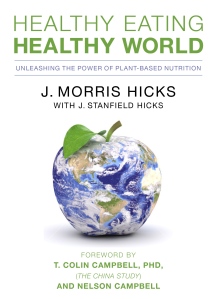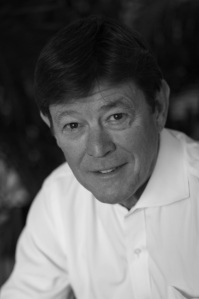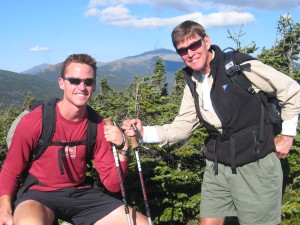
Dr. Dean Ornish wrote the cover endorsement—-and we filled the entire book with a heavy dose of “big picture” CLARITY.
As I mentioned in yesterday’s blog, I decided to revisit our book during the last few days of my 737 daily streak. While I have quoted frequently from the book in my first 733 blogs, I had never shared the entire Foreword or Introduction. In reviewing both of them recently, I refreshed my own memory relative to the accuracy of those pieces in describing what the book is all about.
With that exercise behind me, I am more confident than ever that Healthy Eating, Healthy World is the ideal book for one to quickly grasp the “big picture” relative to the many world-changing consequences of our food choices—beginning with our own health and the resultant cost of healthcare. But that’s just the beginning—the real story deals with the topic of the human induced damage to the delicate balance of nature that may ultimately compromise the planet’s ability to sustain us as a species.
On Monday, I will embellish more on that topic; today, I want to share the complete Introduction to the book—written by J. Morris Hicks.
Introduction to Healthy Eating, Healthy World
“It turns out that if we eat the way that promotes the best health for ourselves, we also promote the best health for the planet.” —T. Colin Campbell, PhD, author of The China Study.

J. Morris Hicks, the “big picture” guy
Millions of creatures have evolved throughout the ages on our planet, and until recently, they have all lived in harmony with nature. During the past few hundred years—a mere blink of the eye in history—one species has unknowingly thrown the natural scheme out of balance. That species is us—the human race. Although we mean no harm for ourselves, for the planet, or for the other creatures, we have drifted far away from the natural diet for our species. We have started eating the wrong food—in great quantities. This change in diet has set in motion a series of chain reactions that has negatively affected the planet in many ways.
Our craving for the rich Western diet has intensified to the point that we have almost totally abandoned the type of fuel that nature intended for us to burn. Whereas animals in the wild with DNA closest to ours consume almost 100 percent raw plants, the humans of the Western world today are consuming virtually none. We now consume generous portions of meat, dairy, eggs and/or highly processed foods three meals a day and are deriving far less than 10 percent of our calories from whole plant foods. In addition, many of the plants that we do eat are french fries, which gain over 40 percent of their calories from the fat in the oil in which they are prepared. This love affair with a very unhealthy diet has begun taking its toll in myriad ways both within our bodies and without, affecting the whole world.
In the United States and other Western countries, obesity and diabetes are running rampant, while heart disease and cancer maintain their position as our top killers—and the top drivers of our health-care costs. These out-of-control costs are choking our economy to death, prompting elected officials in the United States to frequently discuss healthcare cost as the single biggest problem facing our nation. In 1960, the cost of healthcare in the Unites States was 5.2 percent of the gross domestic product (GDP). In less than fifty years, it tripled to 16 percent, and U.S. officials now project that it will double again to 31 percent within the next twenty-five years.[2] This cost is simply unsustainable, and we all know it, but we haven’t yet figured out what can be done to address the problem.
It turns out that much of this healthcare problem is food-driven. We are eating way too much of the wrong food. What is the optimal diet for humans? It’s one based on what your mother may have told you long ago: “You should eat more fruits and vegetables.” We rarely hear health officials, doctors, dietitians, or nutritionists advising us to eat more meat, dairy, or processed foods. They’re all saying we should eat more vegetables, but with each passing year, we seem to be eating fewer. Why is that? The first part of the book explores this question, outlines the many health benefits of an optimal diet and addresses various arguments against the adoption of such a diet.
But health is just one of the issues. What you eat affects far more than just your body. You may already know about some of the environmental impacts of our rich Western diet, but you may not have heard much about other related problems, such as the rising cost and decreasing availability of energy (especially fossil fuels), the increasingly difficult challenge of feeding the growing population of the world, and the horrific suffering of 60 billion animals per year in the factory farms where they are raised. The second part of the book is devoted to an exploration of these four categories of critical global issues.
At some point during your reading, you may very well ask yourself, “Why haven’t I heard all this before?” That is a very good question, inviting us to look at the vast system that controls the flow of this kind of information in our society. The third part of the book explores this question in detail, helping you to digest all that you have read and decide how you will act on that information. Whatever you choose for you and your family, this book can help you execute your plan, providing you with information, helpful tips, and guidelines that you may need to reach your goals.
In a nutshell, this book is all about the single most powerful move that we humans can make to promote our own health, reduce obesity, lower the cost of health care, nurture our fragile environment, conserve our energy resources, feed the world’s steadily growing population and greatly reduce the suffering of animals in factory farms all over the world. Like a blinding flash of the obvious, the single most viable solution to all these issues is an aggressive move in the direction of consuming much more whole, plant-based foods—not necessarily becoming a vegetarian or a vegan.
These “v” words only convey information about what a person does not eat; they do little to convey what the person does eat, and that is what is most important. A great many vegetarians eat an unhealthy diet and, as a result, fail to enjoy the host of benefits that result from eating a truly health-promoting diet. After all, one could consume nothing but Diet Coke and potato chips and call himself a vegan.

That’s my son and co-writer, J. Stanfield Hicks on the left and yours truly on the right.
What about weight loss? While this is not specifically a weight-loss book, adopting a diet of whole plant foods will enable your body to seek its ideal weight effortlessly and permanently. Many health professionals and researchers cite the statistic that diets fail 95 percent of the time. Compare that to a near 100 percent success rate for those who make a commitment to a health-promoting diet for the right reasons—to achieve vibrant health. When vibrant health is your primary objective, effortless weight loss is simply a convenient by-product or fringe benefit.
The primary objective in writing this book was to outline in simple everyday terms the extent of the problems we face along with an explanation of how this all happened— and what each of us can do to make things better. Fortunately, despite the incredible complexity of our current dilemma, the solution is refreshingly simple. All we have to do is educate ourselves, start making better choices in what we eat — then share all that we have learned with everyone that we care about. I am convinced that there has never been anything more important in the history of the world.
“Chase perfection. Settle for excellence along the way.” — Vince Lombardi, What It Takes to Be #1
In case you missed the Foreword by Dr. T. Colin Campbell, click here.
Want to buy a copy of Healthy Eating, Healthy World in paperback, Kindle or Audio? Click here for the Amazon page. Over 90% of the reviews on Amazon scored our book at 5 Stars out of 5.

Consecutive daily blogs
My daily streak will end on February 11 with my 737th consecutive daily blog. But don’t worry—hpjmh.com will NOT be going dark. My plan is that it will be around for a very long time—hopefully long after I am gone. In the meantime, I will continue blogging, updating and adding pages that will focus on my mission of promoting health, hope and harmony on planet Earth.
Want to help support our mission? Click here for a few ideas
Handy 4-piece take-charge-of-your-health kit—from Amazon.com
- The movie that’s changing the lives of millions: Forks Over Knives DVD
- Healthy Eating, Healthy World, The “big picture” about food (our book)
- An essential scientific resource: The China Study by Dr. T. Colin Campbell
- Dr. McDougall’s new book, The Starch Solution, with lots of great recipes.
Want to find out how healthy your family is eating? Take our free 4Leaf Diagnostic Survey. It takes less than five minutes and you can score it yourself. After taking the survey, please give me your feedback as it will be helpful in the development of our future 4Leaf app for smartphones. Send feedback to jmorrishicks@me.com

 International. We’re now reaching people in over 100 countries. Follow us on Facebook and Twitter or get daily blog notices by “following” us in the top of the right-hand column. For occasional updates, join our periodic mailing list.
International. We’re now reaching people in over 100 countries. Follow us on Facebook and Twitter or get daily blog notices by “following” us in the top of the right-hand column. For occasional updates, join our periodic mailing list.
To order more of my favorite books—visit our online BookStore now

J. Morris Hicks, working daily to promote health, hope and harmony on planet Earth.
For help in your own quest to take charge of your health, you might find some useful information at our 4Leaf page or some great recipes at Lisa’s 4Leaf Kitchen.
Got a question? Let me hear from you at jmorrishicks@me.com. Or give me a call on my cell at 917-399-9700.
SHARE and rate this post below.
Blogging daily at hpjmh.com…from the seaside village of Stonington, Connecticut – Be well and have a great day.
—J. Morris Hicks, board member, T. Colin Campbell Foundation


LEST WE FORGET HOW TO REMEMBER Saturday 9 February 2013
It’s good featuring the preamble to Jim’s book. Typical of much of his other submissions on his web site, he has a gift of summarizing basics.
Facts on 16% or so of GDP going for “health” care remain shocking in historical context of it being 7% or so in McGovern’s 1977 hearings! I’m still working on an indexed searchable version of above hearings.
Make no mistake about it. Every valuable idea needs repetition. Books worth reading once often deserve re-reading and further study. Ditto with video and audio related to an author’s work. It’s challenging to process short-term memory data into permanent long-term storage.
According to the pioneer in learning theory and memory, Hermann Ebbinghaus (1850-1909), the percentage of material remembered (preserved in long term memory) after first encounter goes down rapidly unless we “make it our own” by constant review and use.
AFTER first encounter – Percentage of material remembered: 20 Minutes later: 53%, 2 days later: 31%, 31 days later 22% ! Later research has yielded different numbers close to original findings.
Ebbinghaus is important. His “Memory” (English) is on Kindle for $4.95. His classic Über das Gedächtnis is free on Kindle. Please REMEMBER that an actual Kindle device not needed to access. Use Kindle for PC.
CHEERS.